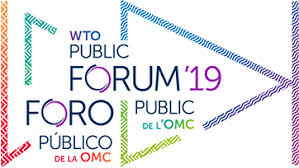Professional services trade: Transformed by digital disruption
11 Oct 2019 02:00h
Event report
[Read more session reports from WTO Public Forum 2019]
The moderator, Mr Andrew Staines (Ambassador, Deputy Permanent Representative of the United Kingdom to the World Trade Organization (WTO)) questioned how the international community should respond to the challenges in the professional services trade during the digital age and how we ensure that no one is left behind.
Ms Alta Prinsloo (Executive Director, International Federation of Accountants (IFAC)) talked about what digitalisation means for accountancy. She mentioned the role of ethics and trust in accountancy in the digital context. She talked about the role and impact of new technologies such as artificial intelligence (AI), blockchain, cybersecurity, and data flows. She said that technology can be used to support greater transparency and more opportunity for clients and people in general. Furthermore, she highlighted the important effects of technology in accountability and in ethics within the industry. She also noted the roles of trust and integrity as key pillars of accountability. In addition, she added that professional judgement is essential in accountancy.
Prinsloo said that key trends are beyond the balance sheet, regulation and uncertainty, and business models. According to her, future-fit accountants must be customer-focused, be digital-and data-driven, and have a growth and change mindset. Finally, she added that they also need to be skilled in: communication, enterprise risk management, performance analysis, integrity, trust, and actionable insights. Answering a question from the audience, she said that it is important to maintain strong ethics. She talked about the importance of the forum to the professional services trade.
Ms Christine Bliss (President, Coalition of Services Industries) started by commenting on digital services and how the forum is the place to discuss the future of professional services trade. She noted the challenges of regulating services on the local level across the world. In addition, she said that professional services are becoming more global and are changing through technology. She mentioned e-payments, digital financial services, and the online insurance sector. In this context, she also talked about the use of AI and machine learning.
Furthermore, Bliss noted domestic regulation as a crucial issue for the professional services trade. She talked about the market access of these services and how such access was related to technical standards and administrative measures. In addition, she emphasised the role of transparency and the adoption of technical orders. She talked about the long transition period that developing countries needed to adopt informed domestic regulations. She mentioned that the flows of data are very important in providing and utilising professional services. She highlighted the e-commerce moratorium as key in supporting the digitisation of the professional services trade.
Answering a question from the audience, Bliss said that there is still huge potential and lots of opportunities in the professional services trade. She used e-payment and data localisation as examples and mentioned the importance of transparency.
Ms Sally Jones (Director, Deloitte LLP) started by asking: what does regulation seek to achieve in the context of professional services? She talked about the regulation of professional services in the digital space, how prescriptive regulations can never keep up, and the global considerations of such regulations. She noted the need for coherent policy direction in the context of professional services and how it is very difficult to regulate digital services.
That being said, she talked about how it is important to impose fewer regulations on technology as well as the essential role of multilateral negotiation in the improvement of the global environment for professional services. Answering a question from the audience, Jones said that blockchain will prove to be a very important tool in the professional services trade. She mentioned that regulation can be easier on the international level. She highlighted that some current jobs are going to disappear in the digital era, and that there will also be new digital jobs that require new skills. Finally, she noted the impact of automation and AI on the professional services trade.
Related event

